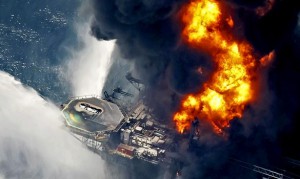Lawsuits over Gulf Oil Spill Floating to the Surface
You’ve probably heard that on April 20, an offshore oil rig in the Gulf of Mexico, run by BP, has exploded, tragically leaving 11 workers missing and presumed dead. Furthermore, the explosion caused several difficult-to-plug leaks in the rig, so it is now spewing millions of gallons of oil into the Gulf.
 For over 2 weeks, oil has been spewing into the ocean, largely unabated, despite the best efforts of everyone involved. The resulting slick is currently about the size of Delaware, and portions of it have reached the Louisiana coast. Unless the leaks are stopped very quickly (and efforts to do so are underway), the slick is all but guaranteed to reach the coasts of Louisiana and other Gulf states.
For over 2 weeks, oil has been spewing into the ocean, largely unabated, despite the best efforts of everyone involved. The resulting slick is currently about the size of Delaware, and portions of it have reached the Louisiana coast. Unless the leaks are stopped very quickly (and efforts to do so are underway), the slick is all but guaranteed to reach the coasts of Louisiana and other Gulf states.
When and if this happens, local ecosystems, including rare and irreplaceable wetlands in Louisiana, could be devastated. Also, local economies, from fishing (on which many livelihoods in the region depend) to tourism, could suffer serious long-term damage.
Considering how fragile Louisiana’s still-underway recovery from Hurricane Katrina appears to be, another economic and environmental disaster is just about the last thing the region needs. The parallels aren’t lost on some commentators, who are already calling this disaster and the perceived tepidness of the federal response “Obama’s Katrina.”
The humanitarian, environmental, and economic consequences of this event have been discussed at length in other outlets. But what of the legal consequences for those who are obviously responsible, and, possibly, those who don’t bear much direct responsibility for this disaster?
There are many, many potential plaintiffs in a case like this. First, and most obviously, are the families of the workers who died. They will almost certainly be able to sue the workers’ employers for wrongful death. These deaths are tragic, but fortunately for the families, any claims they choose to file because of them should be comparatively straightforward. While no lawsuit or amount of money will bring their loved ones back, some people find a small measure of closure when somebody is held responsible for their loss.
We’re likely to see some more complex lawsuits from the individuals and businesses that depend on the Gulf ecosystem for their livelihoods, especially fisherman. Legal wrangling from the Exxon-Valdez spill, which happened over 20 years ago, is still going on in federal court. It’s going to be a long road, to be sure.
Furthermore, these plaintiffs have to choose between filing their claims in federal court, and making claims through a special federal agency created after the 1989 Exxon Valdez spill. Funds for compensation are collected from a special tax on oil companies, along with some damages paid to the claimants directly by the oil company. Furthermore, if the plaintiffs succeed, they will be able to collect their compensation far more quickly than the litigation process, which can take years or decades.
However, unless the claimants can show that gross negligence was involved, compensation through this program is capped at $75 million. Considering that the economic damage from this incident could run up a bill of several billion dollars, it’s possible that this will be woefully inadequate, even if the general fund is also dipped into.
On the other hand, going through state or federal courts leaves no upper limit for damages, but that process can take many years, which won’t do anybody any good in the interim.
The courts will also have to decide where to draw the line for acceptable plaintiffs. There are a huge number of people who will be adversely-affected by this. Only a fairly small percentage of them will actually be able to sue. In American jurisprudence, there is a concept called “standing.” Basically, in order to bring a lawsuit, you have to show that you were directly harmed by the unlawful conduct of the defendant. If you can, you have standing. If you can’t, you don’t.
In a case like this, there will be many more indirect victims than direct victims. Generally, only the most direct victims can bring lawsuits. For example, all of the fishermen who lost business because of the oil spill should be able to sue. Seafood restaurants that had to endure higher prices because of the reduced supply? Maybe. The owners of roadside hotels on the way to Louisiana who lost business because of reduced tourism? Almost certainly not.
As you might imagine, there are going to be a lot of people who don’t fall into any clear category, and courts will have to make some difficult decisions when deciding if they have standing. I certainly don’t envy the judges who have to make these decisions – livelihoods and vindication rest on them – but they need to be made nonetheless.
Whatever happens, it’s likely to be a long and difficult road for these plaintiffs. We can only hope that they will be able to get back to their normal lives as quickly as possible.


Comments